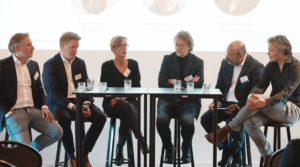The examples of dynamic, social and emerging complexity do show that mastering change and embracing complexity is part of every facet of business operations, from interacting with customers and other parties and taking the right operational decisions, to dealing with a wide variety of business events and managing organizational assets such as information, capacity and resources. If you have not yet read about these different types of complexities you may want to start here.
In determining whether you are able to embrace all dimensions of complexity, it helps to benchmark your operations using these four perspectives: (I) interaction, (D) decisions, (E) events and (A) assets. Answer the following questions to assess your own organization. The more questions you answer with “yes”, the higher the complexity in and around your organization.
” Every transaction and interaction is different “
Dynamic complexity
(I) Our customers find it hard to understand our products, rules and operational decisions. Our communication with stakeholders often consists of explaining these to them. Yes or no?
(D) Seniority in our organization is based on a person’s ability to quickly judge complex situations and make the right decisions. Yes or no?
(E) There are a wide variety of business events, such as customer requests, that we need to process. Yes or no?
(A) It takes considerable effort to keep all product and service components aligned across all parts of our organization, to remain coherent and consistent and provide insight and oversight at will. Yes or no?
“Particularly in the interaction economy, many stakeholders are involved, each having their own requirements and expectations. “
Social complexity
(I) Our interaction with stakeholders is often about changing regulations, new products and services, special requests from customers and other changes in and around our organization. Yes or no?
(D) Nothing is certain until it is certain. Operational decisions are often re-evaluated because of new information. Yes or no?
(E) It is hard to predict which business events, such as customer requests, we can expect, and often events are just different than before. Yes or no?
(A) The information in our databases becomes outdated very quickly; we need to come up with new products and services all the time, and/or our people often need to learn new skills. Yes or no?
“Emerging complexity is characterized by disruptive change and the uncertainty that these disruptions create “
Emerging complexity
(I) Communication can be a dangerous activity. New circumstances can easily place recent communications in a negative light, so we put a limit on our level of transparency. Yes or no?
(D) We make decisions under a high level of uncertainty; it is hard to predict a return on investment or impact on anything else longer than six months in advance. Yes or no?
(E) We need to take a very volatile market into account. Demand may increase or drop based on partially uncontrollable circumstances. Yes or no?
(A) We outsource as much as we can, to keep our asset base as lean and mean as possible, and to make sure we can reallocate investments when needed. Yes or no?

How complex is your organization?
So you have assessed your organization and got the results. Were the results as expected or is your organization more complex than you anticipated? As described in the very first blog, embracing complexity is the perfect way to tackle it. Therefore, next week in our last blog we will discuss how to modernize while embracing complexity. Interested in reading our next blog? Stay tuned by signing up below or follow us on LinkedIn, Twitter and Facebook to stay in the loop at all times. In the meantime, have a look at our website on how Be Informed can help you with turning complexity into value.






